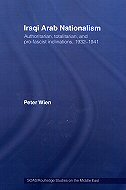|
Iraqi Arab Nationalism: Authoritarian, totalitarian, and pro-fascist inclinations,1932-1941
|
|
Peter Wien
|

|

Iraqi Arab Nationalism Challenges widespread assumptions that interwar Iraq was on a direct path to become a totalitarian state and explains the political and intellectual currents of the period between 1932 and 1941.
The nascent political public of Iraq in the 1930s was a laboratory for divergent political opinions and concepts to shape a nationalist society. Between 1932 and the British occupation in 1941, Iraq was not headed toward a totalitarian state as it is often assumed, but extreme nationalist tendencies were only one facet of a broad range of opinions. Political turmoil in the late 1930s was the consequence of a generational conflict. Closed elite circles controlled the newly founded state, but a younger generation of graduates from state secondary schools and universities challenged the clientelism of the old elite and its dependence on the good will of the former mandate power Great Britain.
This volume provides an original and comprehensive insight into the actual contents of political debates and shows that numerous models of society were discussed in the Iraqi press of the time.[…]
Iraqi Arab Nationalism is essential reading for those with research interests in Middle Eastern studies, Iraq and its history, and Arab nationalism.
Peter Wien teaches North African and Middle Eastern History at Al-Akhawayn University in Ifrane, Morocco. He has previously co-edited Blind fur die Geschichte? Arabische Begegnungen mit dem Nationalsozialismus [Arab Encounters with National Socialism]. His research interests include the role of nationalism and religion in the transformation of modern Arab societies.
|
|
